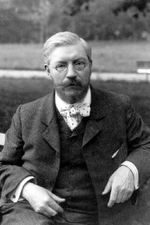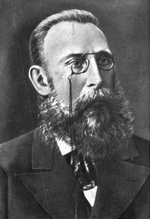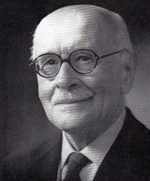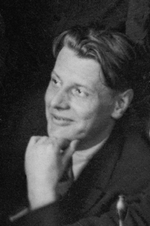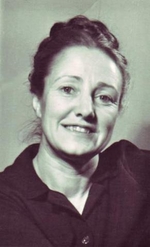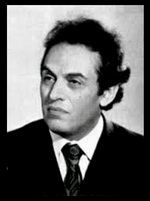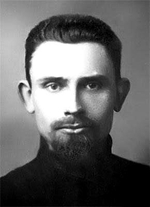Articles
Mikhailovsky Victor (1846‒1904)
Mikhailovsky Victor (1846‒1904) – historian, ethnographer, pedagogue.
In 1870, he graduated from the Historical and Philological Faculty of the Kievan St Vladimir University. Since 1874, he was Ass. Docent of the Moscow University, taught historical disciplines; he was Director of a Moscow pro-gymnasium, teacher of the IV gymnasium. Since 1902, he was Director of the 2nd Moscow gymnasium. In 1900, he became Actual State Council. Member of the Society of Adherents of Natural Studies, Anth
Read More
Miliukov Pavel (1859–1943)
Miliukov Pavel (1859–1943) – historian, political activist, leader of the CD Party.
He graduated from the Historical and Philological Faculty of the Moscow University. In 1886-1895, he was Ass. Docent at the Chair of Russian History of the Moscow University; he also made lectures at the female teachers-training courses in Moscow and Nizhny Novgorod. In 1892, he defended his Master thesis ‘The State Economics of Russian in the First Quarter of the Eighteenth Century and the Reform of Peter the Great’. In 1885, he was elected for Correspondent Member of the Imperial Moscow Archeological Society, in 1890 – for Actual Member.
In 1895-1896, he published one of his main historical research – ‘Essays on the History of Russian Culture’, where he broadly interpreted the history of culture and included social-political history, and the history of literature, theatre, science, and religion.
Read More
Miller Vsevolod (1948–1913)
Miller Vsevolod (1948–1913) – folklorist, ethnographer, linguist.
In 1859-1865, he learnt at the Pension of Ennes in Moscow; in 1865, he enrolled to the Historical and Philological Faculty of the Moscow University.
In 1870, he prepared his Candidate paper ‘Eastern and Western Relatives of One Russian Folk Tale’; he stayed at the Chair of Comparative Linguistic and Sanskrit to prepare himself foe a position of Professor. He also taught Latin at the 4th Moscow gymnasium.
In 1871, he was in expedition at Suvalki District, where he collected Lithuanian songs. In 1874-1876, he was in Germany, where he kept studying Sanskrit and the history of the Ancient East. He studied at the Universities of Tubingen, Berlin, and Prague.
Read More
Minaev Ivan (1840–1890)
Minaev Ivan (1840–1890) – orientalist. Founder of the Russian school of Indian studies.
He graduated from the Chinese-Manchu Dep. of the Oriental Faculty of the St. Petersburg University. He worked at the British Museum and at the Paris Library compiling the catalogue of Pali manuscripts. In 1869, he became Ass. Docent of the Historical and Philological Faculty of the St. Petersburg University. In 1871, he was a member of the Russian Geographical Society. In 1872, he defended his Doctor thesis. Since 1873, he was Professor of the Chair of Comparative Linguistic. Since 1883, he also taught at the Oriental Faculty. In 1874-75, 1880 and 1885-86, he made three travels and visited India, Ceylon, Burma, and Nepal, where he collected local folklore.
His main works were about Buddhism and Pali philology. He also translated Buddhist literature. He was the founder of the Buddhist studies in Russia.
Read More
Minorsky Vladimir (1877–1966)
Minorsky Vladimir (1877–1966) – orientalist, specialist in the culture if the peopkes of Persia and Transcaucasia.
In 1896, he finished the 4th Moscow Gymnasium with a golden medal; he kept his further education at the Legal Faculty of the Moscow University; he graduated from it in 1900. Then, he studied at the Lasarev Institute of Oriental Languages till 1903. He was a disciple of Arabist A. E. Krymsky. In 1903, he got a position at the Asian Dep. of the Ministry of Foreign Affairs. Since 1904, he was a member of the Moscow Archeological Society; he served as a diplomat in Iran and Turkey. In 1911, for his book on the sect Ahl-e Hakk, he was awarded with a golden medal of the Section of Ethnography of the Imperial Society of Adherents of Natural Studies, Anthropology and Ethnography.
Read More
Monseler Georgy (1900–1959)
Monseler Georgy (1900–1959) – orientalist, translator from Japanese and Chinese. In 1936, Head of the Dep. of Non-Christian Religions at the Museum of the History of Religion of the Ac. of Sc. of the U.S.S.R.
He learnt at Peterschule in Leningrad. In 1918, he enrolled to the Japanese-Chinese Department of the Oriental Faculty of the Petrograd University, where he studied with breaks till 1923. In 1920-1921, in parallel with his studies, M. trained in Chinese language at the Leningrad Institute of Living Oriental Languages (passed two years there). In1923, he became Head of the Department of the Far East at the Museum of Anthropology and Ethnography of the Ac. of Sc. In 1926, he was sent to China (Bejing), where he collected exhibits, taught at the Bejing University.
Read More
Nedelsky Vladimir (1903–1958)
Nedelsky Vladimir (1903–1958) – historian of religion.
He was born in the family of a honourary hereditary citizen, learnt at the 13th St. Petersburg Gymnasium transformed into the 2nd Soviet Labour School – he finished it in 1922. In 1925, he graduated from the Legal Department of the Faculty of the Social Studies of the Petrograd University. In 1925-1927, he worked as librarian at the Leningrad Krupskaya Communist Political Enlightening Institute; in 1927-1930, he taught social discipline at the Leningrad Agrarian Technical School.
Read More
Neihardt Alexandra (Alla) (1920‒2007)
Neihardt Alexandra (Alla) (1920‒2007) – specialist in Classic studies, Doctor in History.
In 1938, after a secondary school in Leningrad, she entered the Historical faculty of the Leningrad State University. Since March 1942, she has been in evacuation in Yoshkar Ola. In 1944, she returned to the university. Graduating from it in 1947, she started to work at the Leningrad Branch of the Institute of the History of Material Culture of the Ac. of Sc. of the U.S.S.R. (1948‒1951).
Her Candidate thesis (1952) was ‘Monuments of Ceramic Epigraphic of Myrmekion and Tyritake, as a Source for Studying the Trade Contacts of the Bospoan Kingdom with Centers of the Black Sea in the Hellenistic Epoch’. Her Doctor thesis was ‘The Scythian Tale of Herodotus in Russian Historiography’ (1985).
Read More
Nemirovsky Aleksander (1919–2007)
Nemirovsky Aleksander (1919–2007) – historian of classical epoch, translator, author of popular books and historical fiction, poet.
In 1937, he entered the Historical Faculty of the Moscow State University, and a year after – to the Literary Institute (poetic seminar of Ilya Sel’vinsky).
He was mobilized with the start of WWII, passed thought training at the Tula Armament-Technical School; since March 1943, he was at the Volkhov, Leningrad, and the First Ukrainian Fronts. He finished the war in Germany, was wounded; he was awarded with the Order of Red Banner.
Read More
Nevsky Aleksander (1898–1980)
Nevsky Aleksander (1898–1980) – historian of religion.
In 1917, he entered the Philosophical Department of the Historical and Philological Faculty of the Moscow State University. In 1918-1924, he worked as a school teacher. In 1924, he entered the Briusov High Literary-Artistic Institute. Soon, he transferred to the East Slavic Cycle of the Ethnographical Department of the Geographical Faculty of the Leningrad State University. In 1929, not finishing the course, he went to work at the State Academy of the History of Material Culture as Researcher of the 2nd rank (in ethnography). In 1932, he started to work at the Museum of the History of Religion on the invitation of its first Direcor V. G. Bogoraz. He was Secretary of the Section of Studying Religious Beliefs of the Peoples of the U.S.S.R., under the leadership of N. M. Matorin.
Read More
Showing 181-190 of 351 items.


